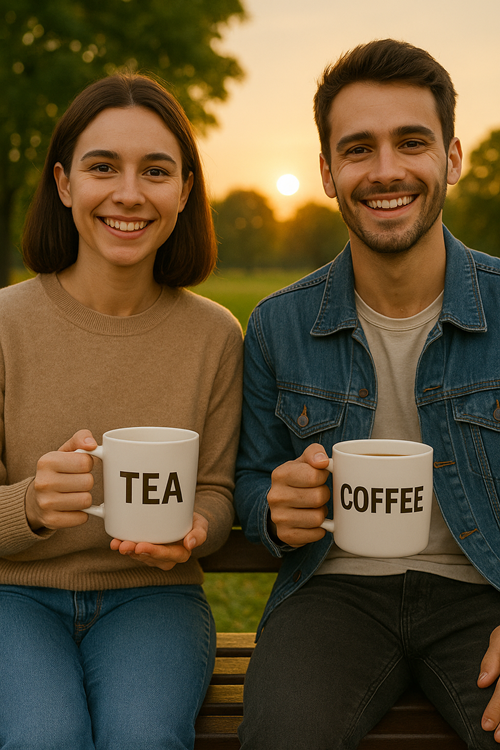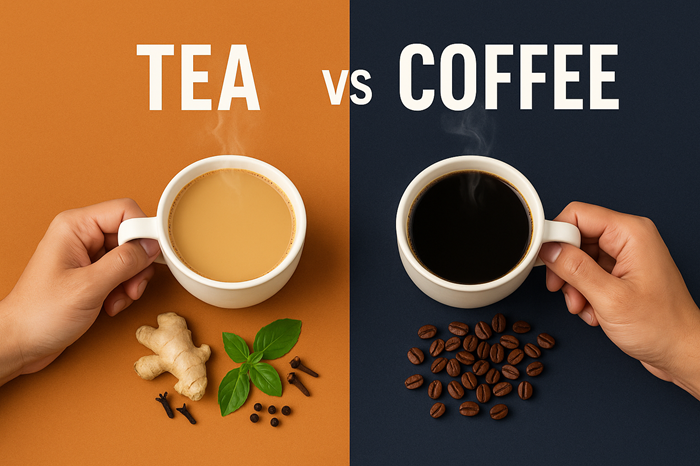I admit it, I’ve always had a foot in two camps. Some mornings, I’m drawn to the delicate grace of tea; others, the bold jolt of coffee. But whether I’m cozied up with Darjeeling Tea first thing or firing up my espresso machine at noon, one thing’s clear – both beverages are steeped in history, culture, and well-being.
Let’s take a deep, flavorful dive into these beloved drinks exploring their origins, health benefits, cultural nuances, expert advice, and yes, even the vibrant contrast between North and South India’s traditions.

Tea vs Coffee
Origins & Legends—Where It All Began
Tea: The Divine Accident
Legend credits Emperor Shennong of ancient China with discovering tea when leaves drifted into his boiling pot, an accidental innovation that would echo for millennia . Shennong, famed for testing hundreds of herbs and even known as the “Divine Farmer,” reportedly used tea as an antidote to poisons . Archaeological finds, including Han dynasty tomb teas, confirm early medicinal use.
Coffee: The Energizing Legend
The story of Kaldi, a 9th-century Ethiopian goatherd, is beloved lore: his goats became unusually lively after nibbling coffee cherries, prompting him (and later monks) to experience coffee’s effects . Although this first appeared in writing circa 1671 and might be apocryphal, later documentation places coffee drinking in Yemen’s Sufi monasteries by the 15th century.
Tea vs Coffee : Global Spread & Consumption
- Tea is the second most consumed beverage worldwide (after water), with over 3 billion cups daily . Key producers include China, India, Turkey, and the UK.
- Coffee claims about 2.25 billion cups daily, especially popular in the U.S., Europe, and the Nordics .
Tea vs Coffee : Health Benefits – What the Research Shows
✅ Tea
- Rich in antioxidants like catechins and theaflavins.
- Supports cardiovascular health.
- Contains L‑theanine, promoting calm focus.
- Herbal teas can aid digestion and immunity.
✅ Coffee
- Delivers caffeine (≈40 mg per 100 ml brewed; ≈212 mg per 100 ml espresso).
- Enhances alertness, metabolic rate, and focus.
- Associated with reduced risks of type‑2 diabetes, Alzheimer’s, and Parkinson’s.
- Major dietary source of antioxidants in Western diets.
Tea vs Coffee : Varieties & Brewing Styles
Popular Tea Types
- Green (grassy, antioxidant-rich)
- Black (bold, robust)
- Oolong (semi-oxidized, floral)
- White (delicate, minimally processed)
- Herbal (like chamomile, mint—naturally caffeine-free)
- Specialty blends: Masala Chai, Matcha
Coffee Varieties
- Espresso (concentrated shot)
- Americano (espresso + hot water)
- Latte & Cappuccino (espresso + milk, foam)
- Cold Brew (smooth, low-acid)
- Turkish (very fine ground, boiled)
- French Press (full-bodied immersion brew)
Tea vs Coffee : When to Sip & Why
- Morning:
- Coffee is perfect for a fast, strong caffeine boost.
- Black or Green Tea works for gentler energy.
- Afternoon:
- Oolong or herbal tea supports digestion and calm.
- Coffee may impede sleep for sensitive individuals.
- Evening:
- Stick to caffeine-free teas (chamomile, mint).
- Skip coffee unless you’re wired and can sleep through it.
Tea vs Coffee Regional Insights: North India vs South India
North India:
A land of chai houses where masala chai rules. Cinnamon, ginger, cardamom, and even saffron go into these aromatic blends. The ritual of chai—served in clay cups, shared with friends—is as much about connection as caffeine.
South India:
Home to frothy filter coffee, born from Karnataka’s Baba Budan Giri (Yemen-imported beans) . Served with frothed milk and sugar in stainless steel tumbler sets, it’s a cherished morning staple—welcome even in remote villages.
Tea vs Coffee: Expert Advice & Personal Recommendations
- Know your tolerance: Stick to 3–5 cups of tea or 3–4 cups of coffee per day.
- Time it right: Avoid caffeine 6+ hours before bed to preserve sleep quality.
- Protein pairing: Add a bit of milk or protein to coffee/tea to stabilize blood sugar.
- Go for quality: Whole-leaf teas and freshly ground beans deliver best antioxidants.
- Switch it up: Rotate between tea and coffee to enjoy varied benefits and tastes.
Tea vs Coffee: Picking Your Brew: A Quick Guide
- Choose Tea if:
You prefer calm alertness, have caffeine sensitivity, and value antioxidants gently. - Choose Coffee if:
You need a strong mental lift, appreciate metabolic perks, and want bold flavor. - Love them both?
Join me in embracing each brew based on mood, time, and taste.
Final Sips—Tea vs Coffee, Your Way
Tea and coffee each come with rich stories—from Shennong’s sacred pot to Kaldi’s energized goats, from North India’s spiced chai to South India’s plumer frothy filter coffee. Both fulfill unique roles in our routines, cultures, health, and daily rituals.
So here’s my challenge: start tuning in to what your body and soul need. One day you might thrive on matcha meditations, another day you might conquer deadlines with an espresso. Whatever you choose, sip it with awareness—and maybe share a cup with friends.
Tea vs Coffee: Frequently Asked Questions (FAQs)
Which is healthier—tea or coffee?
Both tea and coffee offer impressive health benefits. Tea is rich in antioxidants like catechins and theaflavins, supports heart health, and has a calming effect due to L-theanine. Coffee, on the other hand, is known to boost mental alertness, metabolism, and may reduce risks of diseases like Alzheimer’s and Type 2 Diabetes. The healthier option depends on your personal needs, caffeine tolerance, and lifestyle.
Does tea have caffeine like coffee?
Yes, but in much smaller amounts. A standard cup of brewed tea contains around 30–50 mg of caffeine, while a typical cup of brewed coffee contains 80–120 mg. Green and white teas generally have less caffeine than black teas. Herbal teas are usually caffeine-free.
Is it okay to drink coffee or tea every day?
Absolutely—when consumed in moderation. Health experts recommend:
- Up to 3–5 cups of tea daily.
- No more than 3–4 cups of coffee daily (not exceeding 400 mg of caffeine).
Too much caffeine can cause insomnia, jitteriness, or increased heart rate, especially for those who are sensitive.
Can I drink tea or coffee on an empty stomach?
It’s best to avoid drinking coffee on an empty stomach as it may lead to acid reflux, bloating, or discomfort. Tea is generally gentler but can still cause nausea for some. Always pair your beverage with a light snack or breakfast to prevent acidity.
Which is better for weight loss—tea or coffee?
Both can support weight loss when consumed without sugar or high-calorie additives. Green tea is known for its metabolism-boosting properties, while black coffee (without milk or sugar) also enhances fat burning and improves workout performance.
When is the best time to drink tea or coffee?
- Morning: Coffee for a strong start; Green or Black tea for a gentler lift.
- Afternoon: Herbal teas aid digestion; avoid coffee if you’re caffeine-sensitive.
- Evening: Chamomile or peppermint tea helps you relax and unwind. Avoid caffeinated drinks post 5–6 PM to protect sleep quality.
Is tea more popular than coffee in India?
Yes, tea is culturally more dominant in India, especially in North India, where chai is deeply ingrained in daily life. In South India, however, coffee—particularly filter coffee—is a traditional favorite, especially in Tamil Nadu and Karnataka.
Can pregnant women drink tea or coffee?
Yes, but in limited quantities. The WHO recommends no more than 200 mg of caffeine per day during pregnancy. Opt for decaffeinated options or herbal teas (like ginger or lemon) approved by your doctor. Always consult your healthcare provider first.
Which is cheaper—tea or coffee?
In most parts of the world, tea is generally more affordable, especially in countries where it is locally grown like India, China, and Sri Lanka. Premium coffee, especially single-origin or specialty types, tends to be more expensive.
Does tea or coffee stain teeth more?
Both beverages can stain teeth due to their tannin content, but coffee typically causes more noticeable staining. To minimize this, drink water afterward, use a straw, or maintain good dental hygiene.
For more Health and Lifestyle updates, follow Popnewsblend.

Hi, I’m Prashant Jain — a curious soul, storyteller, and content creator at heart.I’ve always been drawn to the world of entertainment, travel, sports, health & lifestyle — not just as a writer, but as someone who genuinely lives these experiences. Whether I’m binge-watching the latest OTT series, exploring offbeat spiritual destinations in India, or diving deep into wellness routines and cricket match insights, I love sharing what I discover with like-minded readers.
PopNewsBlend is my way of blending personal journeys with meaningful stories — ones that inform, inspire, and keep you ahead of the curve. Everything I write comes from real observations, hands-on experiences, and a deep passion for understanding the world around us.
Discover more from Popnewsblend
Subscribe to get the latest posts sent to your email.








Thanks
and
Sincere Regards
Pingback: North Indian vs. South Indian Breakfasts – A Delicious Comparison